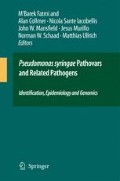We have developed a system to use natural variation between Arabidopsis ecotypes to study the basis of non-host/basal resistance. Our experiments suggest that the leucine rich repeat receptor kinase FLS2 and the flagellin perception system are at the core of this resistance mechanism. However, several genes/loci work in concert with FLS2 to specify non-host resistance in Arabidopsis to P.s. pv. phaseolicola race 6 1448A.
Access this chapter
Tax calculation will be finalised at checkout
Purchases are for personal use only
Preview
Unable to display preview. Download preview PDF.
References
Arnold, D., Jackson, R.J., Waterfield, N. and Mansfield, J.W., 2007, Evolution of microbial virulence – the benefits of stress. Trends Genet. 23, 293–300.
Ausubel, F., 2005, Are innate immune signalling pathways in plants and animals conserved? Nature Immunol. 6, 973–979.
de Torres, M., Mansfield, J., Grabov, N., Brown, I., Ammouneh, H., Tsiamis, G., Forsyth, A., Robatzek, S., Grant, M. and Boch, J., 2006, Pseudomonas syringae effector AvrPtoB suppresses basal defence in Arabidopsis. Plant J. 47(3), 368–382.
Felix, G., Duran, J.D., Volko, S. and Boller, T., 1999, Plants have a sensitive perception system for the most conserved domain of bacterial flagellin. Plant J. 18, 265–276.
Gomez-Gomez, L. and Boller, T., 2000, FLS2: an LRR receptor-like kinase involved in the perception of the bacterial elicitor flagellin in Arabidopsis. Mol. Cell 5, 1003–1011.
Gomez-Gomez, L. and Boller, T., 2002, Flagellin perception: a paradigm for innate immunity. Trends Plant Sci. 7, 251–256.
Jones, J.D. and Dangl, J.L. (2006) The plant immune system. Nature 444, 323–329.
QTL Café, 1998, http://www.biosciences.bham.ac.uk/labs/kearsey/applet.html.
Werner, J., Borevitz, J., Warthmann, N., Trainer, G., Ecker, J., Chory, J. and Weigel, D., 2005, PNAS 102(7), 2460–2465.
Zipfel, C., Robatzek, S., Navarro, L., Oakeley, E.J., Jones, J.D.G., Felix, G. and Boller, T., 2004, Bacterial disease resistance in Arabidopsis through flagellin perception. Nature 428, 764–767.
Zipfel, C. et al., 2006, Perception of the bacterial PAMP EF-Tu by the receptor EFR restricts Agrobacterium-mediated transformation. Cell 19, 749–760.
Author information
Authors and Affiliations
Editor information
Editors and Affiliations
Rights and permissions
Copyright information
© 2008 Springer Science + Business Media, B.V
About this chapter
Cite this chapter
Forsyth, A., Grabov, N., de Torres, M., Kaitell, V., Robatzek, S., Mansfield, J.W. (2008). Basal Defence in Arabidopsis Against Pseudomonas syringae pv. phaseolicola: Beyond FLS2?. In: Fatmi, M., et al. Pseudomonas syringae Pathovars and Related Pathogens – Identification, Epidemiology and Genomics. Springer, Dordrecht. https://doi.org/10.1007/978-1-4020-6901-7_10
Download citation
DOI: https://doi.org/10.1007/978-1-4020-6901-7_10
Publisher Name: Springer, Dordrecht
Print ISBN: 978-1-4020-6900-0
Online ISBN: 978-1-4020-6901-7
eBook Packages: Biomedical and Life SciencesBiomedical and Life Sciences (R0)

